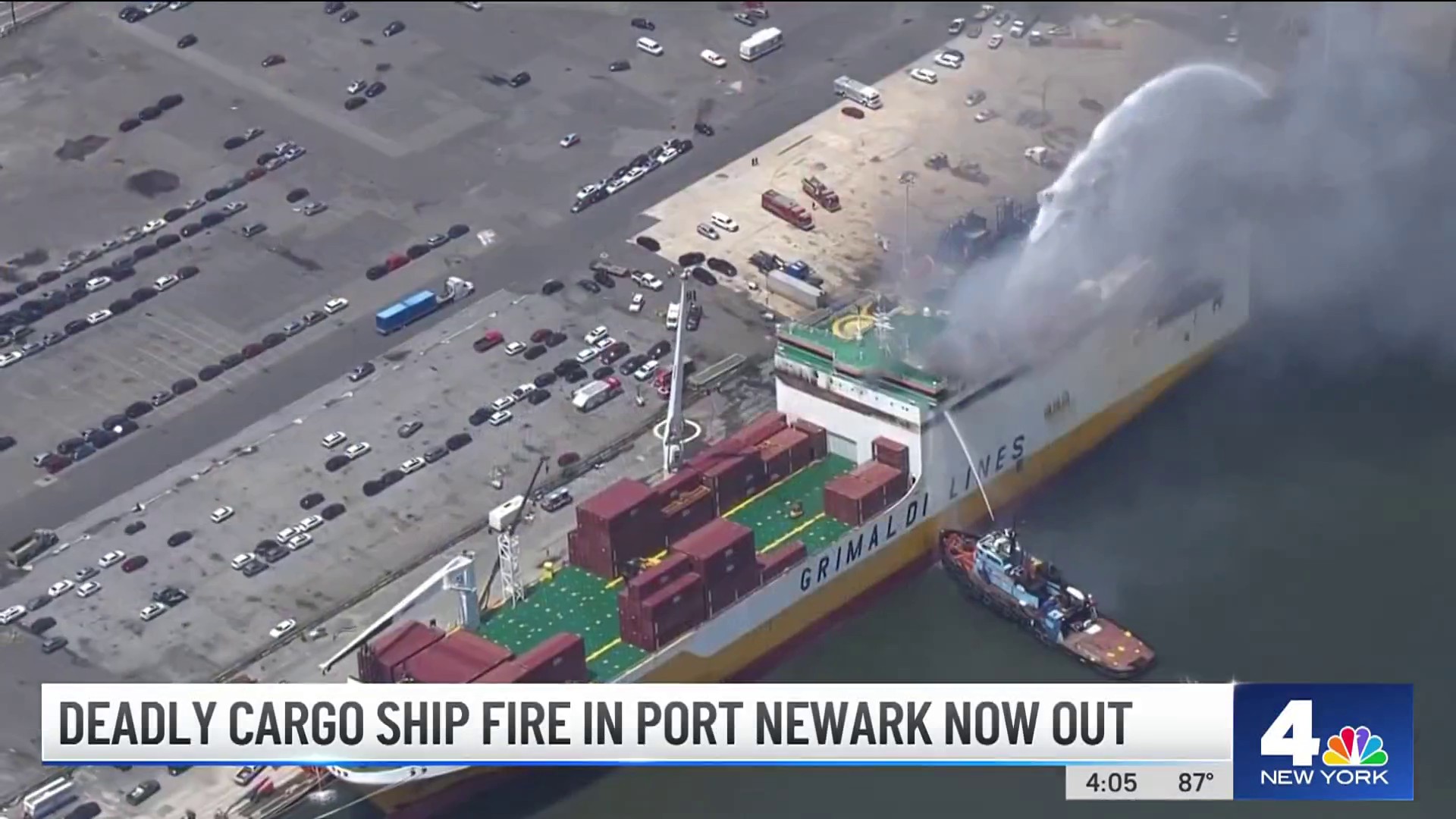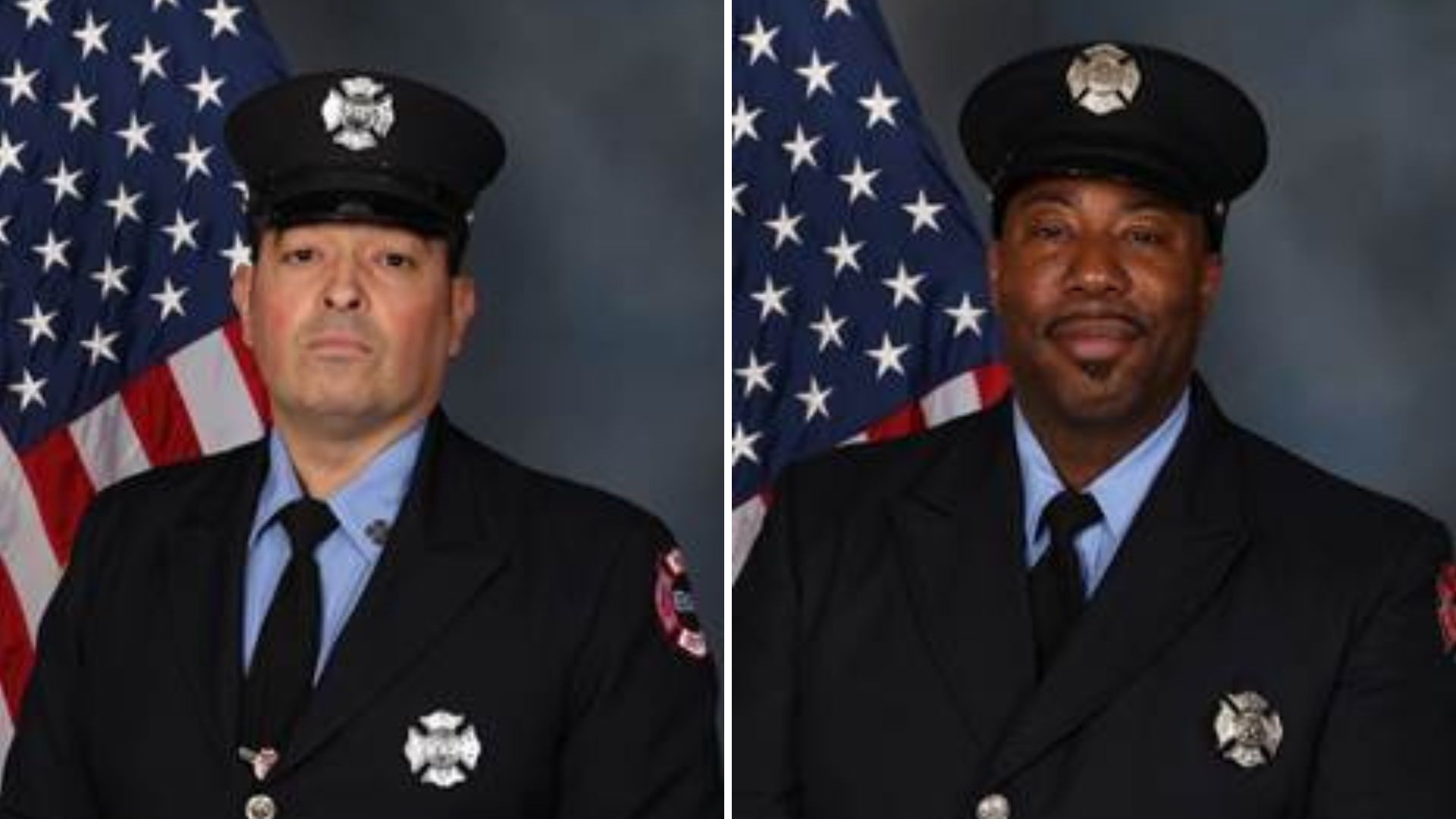What to Know
- The families of two New Jersey firefighters who were killed battling a July blaze inside a cargo ship said Friday a malfunctioning vehicle being used to load cargo onto the ship caused the fire.
- Relatives of Newark firefighters Captains Augusto “Augie” Acabou and Wayne “Bear” Brooks Jr. held a news conference outside the firehouse where the two had worked, saying litigation to be filed in the coming months will seek to hold accountable the Italian shipping company that owned the ship, as well as two stevedore companies involved in loading the vessel.
- The two died battling a fire that broke out July 5 when the Grande Costa d’Avorio caught fire in Port Newark, one of the nation's busiest seaports. The vessel was carrying automobiles.
The families of two New Jersey firefighters who were killed battling a July blaze inside a cargo ship said Friday a malfunctioning vehicle being used to load cargo onto the ship caused the fire.
Relatives of Newark firefighters Captains Augusto “Augie” Acabou and Wayne “Bear” Brooks Jr. held a news conference outside the firehouse where the two had worked, saying litigation to be filed in the coming months will seek to hold accountable the Italian shipping company that owned the ship, as well as two stevedore companies involved in loading the vessel.
The families already have filed notice of intent to sue the city of Newark, alleging the city did not adequately train firefighters to battle onboard ship fires.
Get Tri-state area news and weather forecasts to your inbox. Sign up for NBC New York newsletters.
The two died battling a fire that broke out July 5 when the Grande Costa d’Avorio caught fire in Port Newark, one of the nation's busiest seaports. The vessel was carrying automobiles.
“Wayne was taken from us in a manner that was entirely preventable,” said Michele Brooks, the widow of Wayne Brooks.
The news conference was held outside the headquarters of Engine 16 on what would have been Acabou’s 46th birthday. His brother Miguel said the families “want to prevent future occurrences like this from happening, so no other families have to suffer, just like we are, and will forever.”
Newark Mayor Ras Baraka said he understands the families' need to understand what happened “so that they can make some kind of sense out of their loss.”
“The city wants the same thing,” Baraka said. “We trust that the investigators are completing their process as quickly and expeditiously as possible while maintaining the integrity of their examination and analysis. It’s my deep hope that this investigation will yield the information the families need for healing, and that the answers will benefit all firefighters in Newark, and everywhere.”
Mark Apostolos, an attorney for the families, said his firm's investigation determined that a Jeep Wrangler being used to push cargo on board the ship was observed to have been emitting smoke from its engine compartment several hours before the fire began.
“Despite that, those men continued to use that Jeep Wrangler until it started a blaze,” he said. “That Jeep Wrangler ended up causing a massive inferno to take place aboard the ship's top decks.”
Acabou and Brooks “were caused to enter into that fire and ultimately made the ultimate sacrifice,” Apostolos said.
He said legal time restraints have thus far prevented the filing of a lawsuit in the case, which he said would happen in the coming months.
The Grimaldi Group, the Italian company that owns the ship, did not immediately respond to a message seeking comment Friday. The company has previously said the crew immediately activated onboard fire suppression procedures and local firefighters were called, triggering a prompt response that was crucial to containing and controlling the blaze. It also said no electric cars or hazardous cargo were on board, no fuel spills had been detected, and the stability of the ship was not compromised.
But Apostolos faulted the performance of two five-member firefighting teams consisting of crew members who were responsible for trying to put out the fire. He said they failed to put it out using extinguishers and hoses, and also incorrectly used a CO2-based fire suppression system designed to extinguish a fire by depriving it of oxygen, snuffing it out.
While the system was activated, a door to the main garage on deck 12 remained open, providing the fire with continuous oxygen to sustain the flames, and rendering the CO2 system useless, Apostolos said.
He said the U.S. Coast Guard has not yet determined an official cause of the fire. The Coast Guard did not respond to a request for comment Friday.
INFERNO RIPS THROUGH CARGO SHIP, CONTINUED BURNING FOR DAYS
Firefighters from Newark were dispatched to the docked vessel around 9:30 p.m., Wednesday, July 5, for a report of multiple vehicles on fire on board one of the cargo ships at the port, Newark Public Safety Director Fritz Fragé initially said.
The fire was visible from some distance away as smoke billowed up from the ship that has the capacity to hold around 5,000 cars.
According to a previous press conference, Newark Fire Chief Rufus Jackson, the fire was found on the 10th floor of the ship where five or seven vehicles were fully engulfed. It quickly extended to the 11th and 12th floors.
Firefighters initially made an attempt to extinguish the fire but because of the intense heat, they were pushed back out of the area. It was at this time that two firefighters became lost while backing out, Rufus said.
Searches were subsequently made to find the two firefighters but the rest of the unit were unable to do so.
The fire became so intense that numerous rescue companies were called to assist, Rufus said during a press conference. He added that several specialized rescue companies throughout New Jersey and the state of New York had assisted with primary and secondary searches to try to locate the unaccounted-for firefighters, which were eventually found and removed from the structure.
"I just want the world to know that we just lost two of our best here in the city of Newark," Baraka said hours after the fire during a press conference to update the public on the matter. "Two of our bravest here in this city who without hesitation gave their lives and probably that morning didn't think they'd be fighting the fire on a ship of five thousand cars. Something they had not trained for. And would not return home that evening."
The fire continued to burn for days, finally being put out almost a week later, on July 11, according to U.S. Coast Guard officials.
In an update from the scene following the deadly inferno, Coast Guard and Port Authority officials said the ship’s manifest showed no electric cars on board, diffusing speculation that the fire was fueled by lithium ion batteries while investigation into the cause continued.




